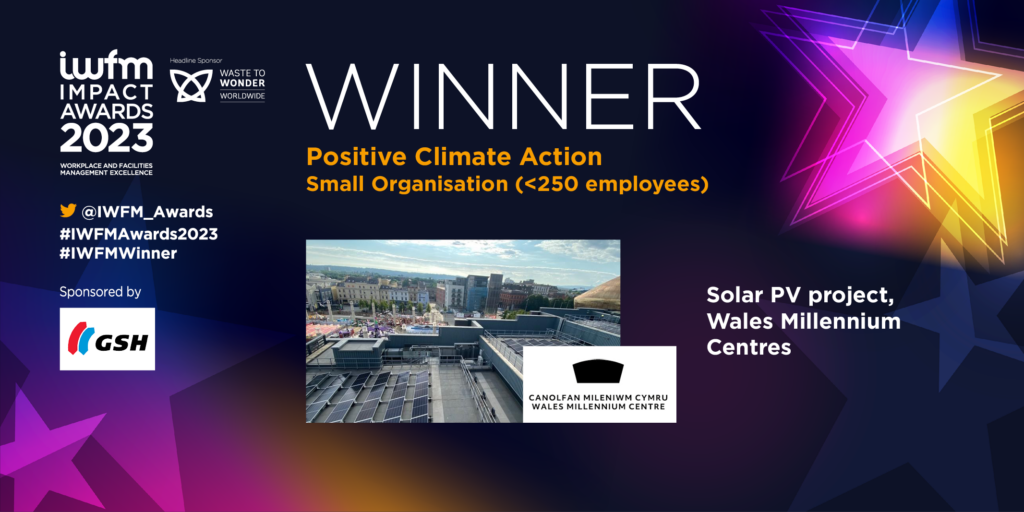Winner: Solar PV project, Wales Millennium Centre
Sponsored by: GSH Group

Wales Millenium Centre is based in Cardiff Bay, and welcomes over 1.8 million guests a year to its various events and performances. It’s also a national landmark for Wales, with the aim to “inspire the nation, impress the world.”
With energy costs on the rise, the venue was keen to look at ways to ensure it could generate enough energy to power an auditorium with 1,900 seats. The building features a large flat roof area, making it ideal for solar panels which would allow it to generate its own electricity, cut energy costs and help reduce its carbon emissions.
The operations team set about exploring the potential of solar PV, and developed a business case to apply for funding. This was initially declined, but a more robust case was then put forward to the managing director and senior leadership team, and funding was secured.
The venue’s engineering manager worked closely with several solar providers to establish the best solution, including the combination of panels and inverters that would be most efficient, before partnering with Joju Solar. Initially the target figure was to generate 10 percent of the amount of electricity used in the last year before the pandemic, although the use of two smaller roof spaces added to the capacity. Eventually, in 2021, some 720 345W JA solar modules and four Solis inverters were fitted, in less than two months.
Results gleaned
At the time of installation, the system was forecast to generate an annual amount of 192,922kWh, which would equate to 49.3 tonnes of C02 savings over 12 months. However, generation in the first 12 months came in at 224,699kWhs, with 52 tonnes of CO2 savings; an increase of 16.5 percent on the original figure. The amount produced will now cover more than 10 percent of the venue’s electricity in future, giving it enough energy to power stage activities – including heating and cooling – for the next 25 years. On 10 July 2022, the panels generated a huge 1,549.48 kWh, which contributed to a financial gain of nearly £5,000 for that month.
As well as having a demonstrable impact on the organisation’s carbon emissions, which is visible in its Display Energy Certificate that is significantly better than other comparable centres, the financial savings are helping to ensure the venue remains viable at a time when energy costs remain high.
The venue is now looking for ways in which it can expand the number of installations, including the use of flexible solar PVs and whether they could potentially be installed along the curvature of the main building. Other options include installing panels on a canopy, as well as making use of vertical axis wind turbines.
Lighting is another area of focus; to date, the venue has changed two-thirds of its fittings to energy-efficient alternatives, reducing energy costs by 68 percent. It is committed to becoming carbon-neutral by 2030, in line with the wider One Planet Cardiff strategy.
Best practice learning point
The project highlighted the importance of being bold and of individuals acting on their own initiative, rather than waiting for top-down schemes. Planning and preparation were vital in ensuring the project ran smoothly.
Key quotes
“The success of the project has garnered interest from the Welsh parliament FM team, who have visited to tour the installation and receive advice about our experiences.” – Alex Mathias, business operations support, Wales Millennium Centre
“Our solar PV project reduces the impact we have on the environment and complements our mission of raising the aspirations of young people in Wales, as we can provide a creative hub that will, through sustainable practice, continue to thrive and inspire.”
